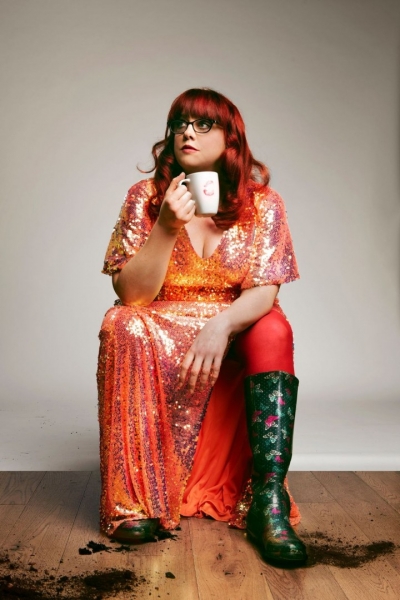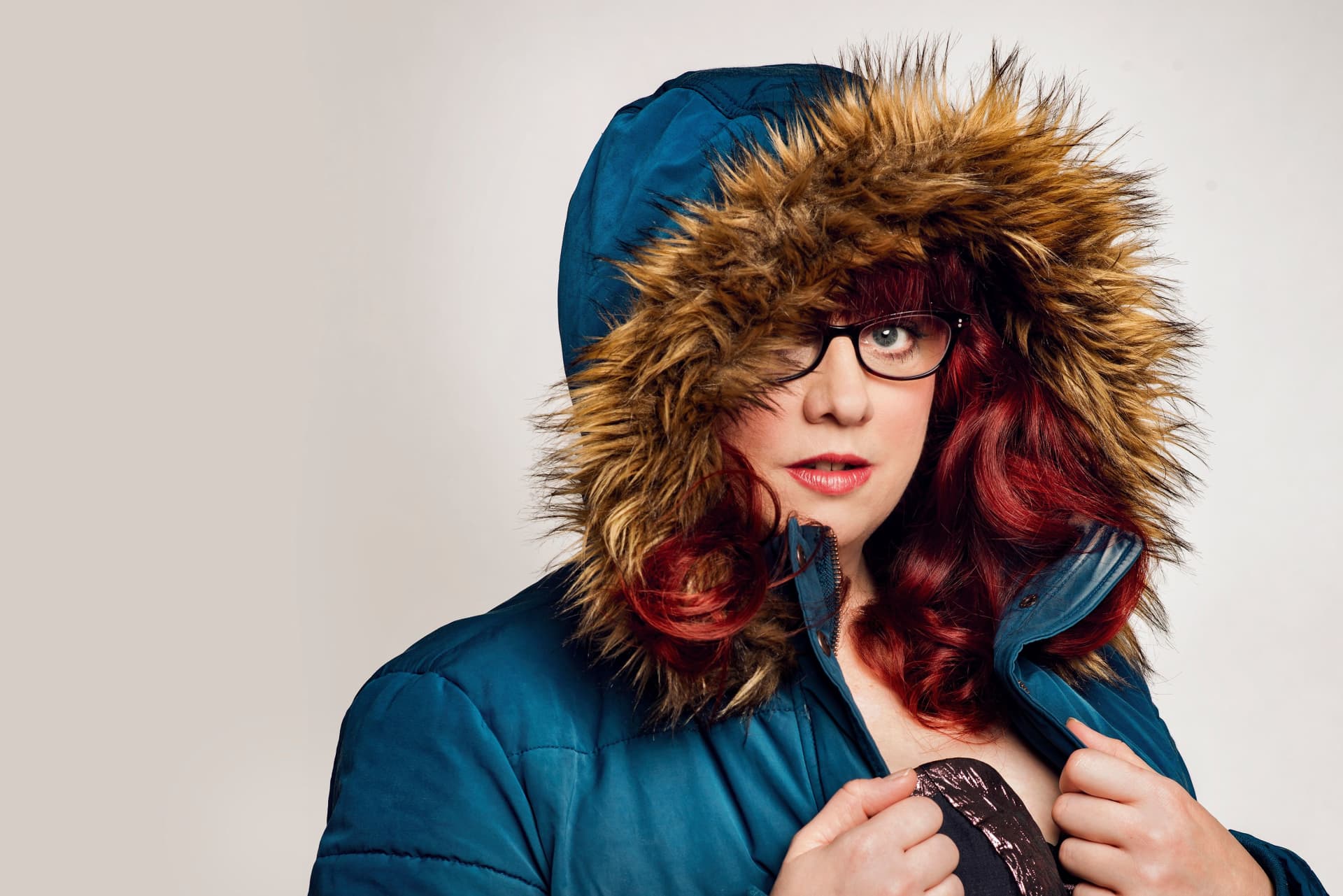Ahead of her appearance at Oxfordshire’s Truck Festival this July, I spoke with beloved stand-up comedian Angela Barnes, about her upcoming material surrounding her recent ADHD diagnosis. As well as this, we talk self-care, representation in comedy and words of wisdom within the industry.
You’re coming to Truck Festival in July which is very exciting – I can imagine the atmosphere at festivals contrasts with that of regular touring, do you have a preference?
When you’re doing a tour a show or you’re in a comedy club, people have come just to see stand-up comedy. They know what they’re getting because they’ve bought a ticket for that specific event, whereas at a festival you often just have people who have sat down and can’t be bothered to move. You’re not always going to be performing to an audience who know who you are, so sometimes you have to win them over. It’s usually good fun though – British weather can play a big part because if they're all a bit soggy and miserable in a field then they’re not always the easiest to win over.
The nature of performing comes with extreme highs and sometimes lows, do you ever find that unpredictability quite mentally draining?
It can be but it can also be what attracts some people to comedy, that thrill. However long you’ve been doing it and however good you are, you never lose that fear that tonight’s going to be a bad gig because it happens and there are all sorts of alchemy that can make that the case. The thing with comedy, as opposed to many other kinds of performance, is the feedback is immediate; either they laugh or they don’t, so it keeps you on your toes and I like that. You can then work out whether you’re on the right track and fix it.
Do you think it served as a hindrance to your career that you might not have seen much female representation in the comedy world?
You’ve got to see it to be it, and I believe that’s true whether it comes down to race, gender, diversity, sexuality, wealth, and whatever else. If all you see on television is a certain type of person then you assume that role isn't for you. When I was growing up there were amazing female stand-up comedians on television like Victoria Wood and Jo Brand who – for me growing up – were huge inspirations, but I felt like they must have had to fight hard to get there, which they did. It never occurred to me – even though I was a massive comedy fan – that I could do stand-up comedy. I didn’t start until I was in my mid-thirties when suddenly I felt like it was something I could do and that was because I could see more women doing it. There’s definitely a direct correlation between those things and now most panel shows on TV are half women, so if you’re a young girl now you may not have to have those conversations with yourself. There was a time when you could be a fairly mediocre comic as a man, but you would still get on TV because there were more seats for you. As a woman, on the other hand, you had to be even better, certainly better than the mediocre men! I think that’s why there’s a kickback now. I think one of the definitions of privilege is thinking that equality means something is being taken away from you, but it isn't, it’s just the playing field being level. If you've been in a position of privilege – whether you know it or not – it can feel like you’re being robbed of something for other people to have a chance.

Your upcoming material will surround the topic of ADHD following your recent diagnosis, did this diagnosis come as a relief?
Absolutely. People often regard labelling as a negative thing, I’ve had so many people ask why I needed that label and what difference it made, and I think the difference is how I understand myself because it is fundamental to who I am. ADHD isn't something I just got, it’s something I’ve had my entire life without knowing it. The way it presented itself meant that I really struggled in certain situations that my peers may not; things like holding down relationships, jobs, being settled, and meeting those arbitrary life goals that my friends seemed to sail through. I really struggled to settle at university but didn’t know why, and the only way I could interpret that was that I was a failure, and I just couldn't do the things that other people could because I was lazy or stupid. I knew those things weren't true because of how anxious I was about failure and how sick I made myself and how depressed I got. I was treated for years for depression and anxiety and all these things that were actually just born out of the frustration of not understanding why I was different. Having the diagnosis allowed me to look back and understand that my brain is structured differently so it’s not a failure in me. Getting the diagnosis doesn't mean that the world becomes easier to navigate but it means that I can stop beating myself up. I spent my whole life feeling like a square peg in a round hole and finally, someone’s just like ‘sorry you had the wrong hole, this is yours’. This is why life is like that and it’s okay. Pretty much everybody who I’ve spoken to within the community of people with ADHD who have been diagnosed with it later on in life (especially women as it’s less recognised) have said they wish they knew when they were a kid because all those years of frustration and depression wouldn't have happened. So, while I totally get the anxiety of labelling a child when they’re young, just because you don’t label your child with ADHD doesn't mean they don’t have it.
Why do you think there’s not much recognition for how ADHD presents itself in women?
There are lots of reasons, but one is quite simply that until very recently, all the studies that were initially done on ADHD were done on young boys and it was just assumed that it would present itself in the same way in women. The diagnostic criteria were set and if you didn’t meet them, that wasn't your issue, something else was. The H (hyperactivity) part of ADHD is often considered as just naughty boys throwing chairs across classrooms, running around and not being able to sit still. That was never me but as my psychiatrist said to me, the H can be internal. It’s your brain that’s hyperactive and mine is like a laptop with all the tabs open, I can’t focus on just one of them, I get easily distracted from one task without completing it, and I get bored easily. That’s one of the reasons why it wasn't picked up in women; because girls weren't being disruptive. The only disruption I had when I was a child was to myself. I was very anxious, worried about pleasing people and always wanting my teachers to praise me. I was called a bit of a worrier but that was the extent of it, and it was never understood as being a damaging thing. You take that into adulthood though and I was then labelled as very anxious and depressed as I wasn’t meeting those goals that I mentioned before. At one point, I was even diagnosed with bipolar disorder and put on mood stabilisers, but I felt within me that something more was going on and I wasn't just depressed out of nowhere. I think women get diagnosed with depression quite easily, more so than men, because it’s brought back to your hormones.
What would you say to people who think ADHD is being over-diagnosed?
I’ve had people tell me, ‘Oh, you’re lucky it’s fashionable.’ and it’s like, excuse me? I’ve had 40 years of a really bad time, don’t tell me that what I’ve got is fashionable just because a lot of people are being diagnosed at the moment. I think there’s a tendency for people to see lots of people getting diagnosed and assume from that that it’s not really a thing, if ‘everyone’s’ got it. It is a large percentage of the population and because the diagnostic criteria are only now being worked out, it’s only now that people can get the help they need. Rather than it suddenly being over-diagnosed, I think it’s instead been underdiagnosed for a really bloody long time and now, finally, people are getting what they need. A lot of comedians are getting diagnosed at the moment and we might look at each other and think, ‘We can’t all have it, surely.’ but we probably can because there’s a reason why we’re all doing this job instead of working in a shop or an office. People will say to comedians that they don’t know how we do this job, and I think, ‘Well I don’t know how you go to the same office every day, I couldn't do that.’ There’s no dopamine hit as good as standing up on a stage and trying to make people laugh, so it makes perfect sense to me that most of us have it. We’re constantly getting that stimulation and that dopamine. I’m more surprised at the people doing this job without ADHD.
What do you consider or practice as self-care?
Self-care is such an individual thing and I’ve tried in the past with things like meditation, but I just got frustrated that it wasn't doing anything. My brain would wander, and I would finish in more of a state than I started. For me, self-care is more about how I talk to myself. My whole life I’ve been really horrible to myself so for me, self-care is about trying to put down that voice in my head that’s telling me I’m not good enough. Another thing that helps which I should really do more often, is swimming. One of the things that comes with having ADHD sometimes, is having intrusive thoughts so one of the ways I’ve dealt with that without realising, is by counting. If I was walking down the street, for example, to stop the thoughts I’d count my steps or something and then the thoughts stop because I’m concentrating on something else. That’s what I love about swimming because I count my lengths and strokes and so while that might not sound calming to some people, for me it keeps the voice in my head busy. That’s probably the calmest I feel, in a swimming pool.
What’s the best piece of advice you've been given in your career?
Don’t be a dick. Whatever you’re doing in this industry, you’re no more important than anyone else and there are hundreds of people behind you ready to take your place. Everyone who works on a TV or radio show, whatever they’re doing, they’re just trying to get through the day, so treat them with respect and don’t be a pain in the arse to work with. If you are, next time they’re looking for a comedian they won’t choose you. Say your pleases and thank-yous, turn up on time and don’t be a nuisance.









